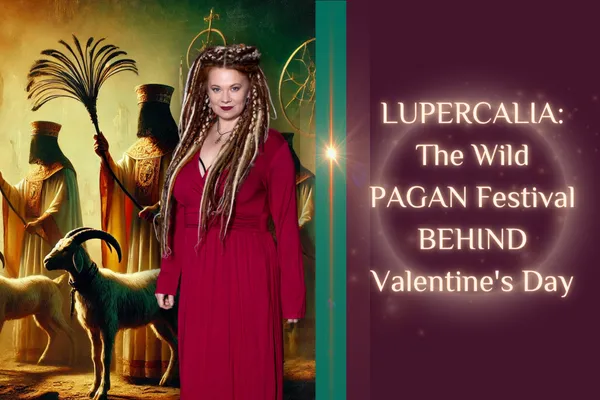BRIGATTA
Blog

Lupercalia - The Wild Pagan Festival Behind Valentine's Day
"The focus on love, connection, and fertility, albeit in a far more polished form, are direct descendants of this ancient festival."
Unearthing the Wild Roots of Valentine's Day: The Magic of Lupercalia
Roses, chocolates, and romantic dinners define Valentine's Day in its modern form. But did you know that the origins of this beloved holiday are rooted in a much wilder, primal celebration? Enter Lupercalia, the ancient Roman festival of fertility and purification held from February 13th to 15th.
Unlike the polished and commercialised Valentine's Day we know today, Lupercalia was a raw and chaotic celebration. It honoured life's untamed forces with animal sacrifices, wild feasting, and fertility rituals. The festival was dedicated to Faunus, the Roman god of fertility, agriculture, and wild nature, and celebrated the legendary founders of Rome, Romulus and Remus.

The Origins and Rituals of Lupercalia
Lupercalia's name derives from the Lupercal Cave, where, according to legend, Romulus and Remus were suckled by a she-wolf. This cave, along with the wolf itself, became powerful symbols of protection, vitality, and connection to the wild forces of life. The festival began with priests, known as Luperci, performing rituals in the cave to honour Faunus and the legendary founders of Rome. One key ritual involved the sacrifice of goats and occasionally dogs, which represented fertility and purification respectively.
The blood of the sacrificed animals would be smeared on the foreheads of the Luperci in a ceremonial act, followed by a cleansing ritual with milk. This combination of blood and milk symbolised the shedding of the old and the renewal of purity. Once the formal rituals were complete, the festival moved onto the streets where nearly naked Luperci, and other men, ran through the city striking women and crops with strips of goat hide, known as Februa. This act was believed to bestow blessings of fertility and prosperity.
Matchmaking and Transformation to Valentine's Day
One of the most fascinating aspects of Lupercalia was its matchmaking element. Some accounts suggest men and women were paired off through a lottery system during the festival, likely with an eye toward fertility and natural connection.
However, by the 5th century, as the Roman Empire transitioned into a Christian stronghold, the Christian Church saw the raw and naked celebrations of Lupercalia as incompatible with its values. In 496 CE, Lupercalia was officially banned by the Pope and replaced with Valentine's Day on February 14th, a new holiday inspired by the story of St. Valentine. Over time, Valentine's Day transformed into the celebration of romantic love we recognise today.
Lupercalia's Modern Relevance
Despite its transformation, the energy of Lupercalia still lingers beneath the surface of Valentine's Day. Themes of love, connection, and fertility continue to resonate, albeit in a more polished form. The ancient celebration reminds us to honour life's cycles, nurture potential, and reconnect with our authentic selves.
Integrating Lupercalia's themes into modern-day rituals can be as simple as a cleansing bath, a smoke cleanse, or even planting literal seeds. It's about breaking the rules and connecting with your raw, untamed energy—whether through self-love rituals or sharing a feast with loved ones.
Curious to learn more about Lupercalia and how to incorporate its primal energy into your life? Watch the full video on our YouTube channel, The Wild and Untamed Way, and dive deeper into the wild side of our modern traditions.



Listen to Our Podcast Anywhere, Anytime!
Coming Soon...
Tune in from your favorite podcast platform or our website, and let the wisdom of our guests and host, Emma, accompany you on your path to personal growth and transformation, no matter where life takes you.
Sign up now and receive a free monthly ritual to ignite the magic within!
COPYRIGHT © 2024 WILD AND UNTAMED ALL RIGHTS RESERVED|THEME BY EASY PEASY BUSINESS


